英语词汇学-第五章 词义的变化
词义的变化

(2)联想意义/关联意义associative meaning 词的关联意义又叫联想意义,是词的附带 意义,包括词的感情色彩,文体意义等,这 种意义不稳定,变化大。 Woman一词,让我们联想到“妈妈”, “养儿育女”,“温柔”,“持家”“脆 弱”。
词的关联意义可分为: 内涵意义 connotative meaning 社会意义 social meaning 情感意义 affective meaning 反映意义 reflected meaning 搭配意义 collocated meaning
小结 1.概念意义 2.内涵意义 3.社会意义 4.情感意义 5.反映意义
6.搭配意义
7.主题意义
逻辑、认知或外延的内容 通过语言所指事物来传递的意义 关于语言运用的社会环境意义 关于言者/作者的感情和态度意义 通过同一个词语的另一意义的联想 来传递的意义。 通过与倾向于出现在另一个词的环境 中出现的词的联想来传递的意义 通过组织信息的方式(语序、强调) 所传递的意义。
词义变化的基础
词义的变化(change of meaning)指的是词 义的改变和新义的产生。由于有的事物之间 在功能、形状、动作等特征方面存在着某些 相似之处,词可从一种事物、现象、行为的 名称转指另一种事物、现象、行为的名称, 如隐喻、借代、提喻等。这是词义的改变和 新义产生的基础。
I.词义的组成 (语法意义和词汇意义)
Hale Waihona Puke (2.2)社会意义social meaning 指关于语言运用的社会环境的意义,主要代表是 “文体/风格”意义stylistic meaning. 一类词的概念意义相同,风格意义不一定相同. 如: a. horse 一般用语, steed 诗歌用语, nag 俚语, geegee 儿语 b. father 中性, male parent 书卷气,专业术语, daddy 口语,儿语
英语词义的变化
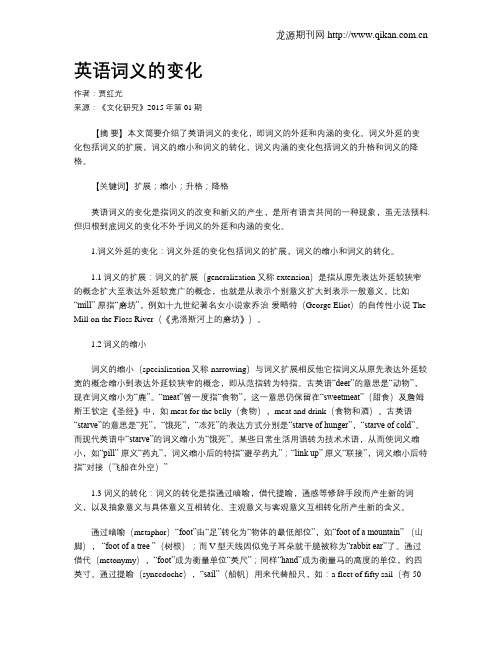
英语词义的变化作者:贾红光来源:《文化研究》2015年第01期【摘要】本文简要介绍了英语词义的变化,即词义的外延和内涵的变化。
词义外延的变化包括词义的扩展,词义的缩小和词义的转化,词义内涵的变化包括词义的升格和词义的降格。
【关键词】扩展;缩小;升格;降格英语词义的变化是指词义的改变和新义的产生,是所有语言共同的一种现象,虽无法预料.但归根到底词义的变化不外乎词义的外延和内涵的变化。
1.词义外延的变化:词义外延的变化包括词义的扩展,词义的缩小和词义的转化。
1.1词义的扩展:词义的扩展(generalization又称extension)是指从原先表达外延较狭窄的概念扩大至表达外延较宽广的概念,也就是从表示个别意义扩大到表示一般意义。
比如“mill” 原指“磨坊”,例如十九世纪著名女小说家乔治·爱略特(George Eliot)的自传性小说The Mill on the Floss River(《弗洛斯河上的磨坊》)。
1.2词义的缩小词义的缩小(specialization又称narrowing)与词义扩展相反他它指词义从原先表达外延较宽的概念缩小到表达外延较狭窄的概念,即从范指转为特指。
古英语“deer”的意思是“动物”,现在词义缩小为“鹿”。
“meat”曾一度指“食物”,这一意思仍保留在“sweetmeat”(甜食)及詹姆斯王钦定《圣经》中,如meat for the belly(食物),meat and drink(食物和酒)。
古英语“starve”的意思是“死”,“饿死”,“冻死”的表达方式分别是“starve of hunger”,“starve of cold”。
而现代英语中“starve”的词义缩小为“饿死”。
某些日常生活用语转为技术术语,从而使词义缩小,如“pill” 原义“药丸”,词义缩小后的特指“避孕药丸”;“link up” 原义“联接”,词义缩小后特指“对接(飞船在外空)”1.3 词义的转化:词义的转化是指通过暗喻,借代提喻,通感等修辞手段而产生新的词义,以及抽象意义与具体意义互相转化、主观意义与客观意义互相转化所产生新的含义。
第五章 词义的变化

二、词义变化的形式
1. Expansion (extension/generalization) 词义的扩展 2. Narrowing(restriction/specialization) 词义的缩小 3. Elevation (amelioration) of meaning 词义的升格 4. Degradation/degeneration/deterioration词义的降格 5. 词义的转移
his father, who saw the fire, told my mother who told me.
2. 中心意义与次要意义之连锁联结
连锁链接:concatenation:
从一个词义中衍生处第二个词义,第二个词义有衍生处第三 个词义,如此下去。
1
2
3
4
2. 中心意义与次要意义之连锁联结
Handwriting Control Help
hand
A pointer on a clock
A practiser of a skill When experienced directly
Xinjiang Agricultural University
2. 中心意义与次要意义
1. A workman: He is a machine hand. 2. A sailor on a ship: All hands are on deck. 3. Handwriting: He writes a clear hand. 4. Help: he gave a hand to me. 5. A pointer on the clock: On the clock there are three hands:
从特指到泛指
英语词汇学--词义的变化

Narcissus 水仙花
Munchausen
说大话的人
He was a German s o l d i e r. A f t e r h i s retirement from his service in the Russian Army against the Turks, he told exaggerated stories of his c a m p a i g n i n g adventures,thus the meaning:a person who boasts;exaggerated .
Sandwich: It now denotes a popular fast food. It originates from John Montague, Fourth earl of Sandwich in 18th -century England. He was so fond of gambling that he often forgot his meals. He often ordered slices of bread with thick pieces of roast beef stuffed between them be brought to him so he could eat while playing. Later, people used his name to refer to all similar food.
专有名词普通化与特定的历史事件有关: “Watergate”源指美国华盛顿特区综合大 厦。1972年6月17日夜间,共和党争取 总统连任委员会有关人员潜入大厦内 民主党全国委员会总部而被捕,暴露 了共和党政府在总统竞选中的非法活 动,导致美国历史上首次总统辞职, 现泛指“丑闻”。
英语词汇的语义演变
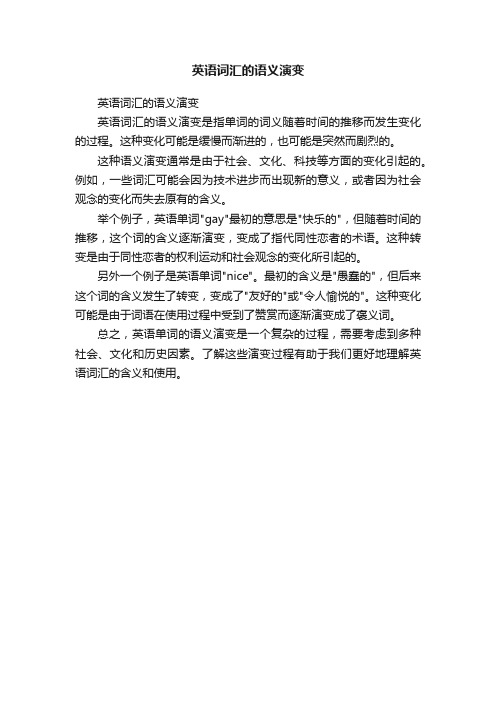
英语词汇的语义演变
英语词汇的语义演变
英语词汇的语义演变是指单词的词义随着时间的推移而发生变化的过程。
这种变化可能是缓慢而渐进的,也可能是突然而剧烈的。
这种语义演变通常是由于社会、文化、科技等方面的变化引起的。
例如,一些词汇可能会因为技术进步而出现新的意义,或者因为社会观念的变化而失去原有的含义。
举个例子,英语单词"gay"最初的意思是"快乐的",但随着时间的推移,这个词的含义逐渐演变,变成了指代同性恋者的术语。
这种转变是由于同性恋者的权利运动和社会观念的变化所引起的。
另外一个例子是英语单词"nice"。
最初的含义是"愚蠢的",但后来这个词的含义发生了转变,变成了"友好的"或"令人愉悦的"。
这种变化可能是由于词语在使用过程中受到了赞赏而逐渐演变成了褒义词。
总之,英语单词的语义演变是一个复杂的过程,需要考虑到多种社会、文化和历史因素。
了解这些演变过程有助于我们更好地理解英语词汇的含义和使用。
英语词汇学论文---词义的变化

英语词汇学论文---词义的变化The Causes of Changes in Word Meaning Abstract:Key words: historical; social; psychological; linguistic; semanticDo you know when Juliet tells Romeo, “I am too fond”, she is not claiming she likes Romeo too much? She means “I am too foolish” Do you know when Horatio says to Hamlet, “Season your admiration for a while…”, he is not telling Hamlet “to increase his respect( the current meaning of admiration) for something”?In fact, he means “ to moderate his astonishment.”Don?t be surprised, because, as Quirk asserts, almost every word we use today has slightly different meaning from the one is had a century ago; and a century ago it had a slight different meaning from the one it had a century before that. When a word loses its old meaning and comes to refer to something altogether different, the result is a change of word meaning.As nonnative English learners, learning the causes of changes in word meaning can help us deepen the understanding of the meaning of lexicology, vocabulary, semantic field and culture background. By learning this, we can use vocabulary in a more precise way and avoid mistake or embarrassment when communicating with native speakers.The causes of changes in word meaning can be divided into linguistic cause and extra-linguistic cause. Extra-linguistic cause can also divide into historical cause, social cause and psychology cause.Linguistic causeChange of meaning is frequently brought about by two tendencies in a linguistic system: towards ellipsis and towardsanalogy. Some linguists think foreign influence should subordinate linguistic cause.Ellipsis occurs when a phrase is shortened to one word which retains the meaning of the whole, so it often occurs in habitual collocations, such as adjective + noun or attributive noun + noun. Private, daily, duplicate are all adjectives, but they are used as nouns. Private means a soldier of the lowest rank, daily means daily newspaper, and duplicate means duplicate copy. Under such circumstances, whatever is left, whether a noun or an adjective, is all used as a noun assuming the original meaning. Naturally, the association became so close that the first element could alone carry the meaning of the whole phrase.Besides, there is a change of grammatical function as well, as when adjectives assumethe roles of nouns. Unlike the above examples, whose sense of one word has been transferred to another simple because the two occur together habitually, in some cases, it is the second or “headword”of the phrase that remains. For example, (stream) engine, (coal) gas and (light) bulb.The analogical tendency means new meanings developed in one part of speech are passed on to other parts of speech from the same lexical bas e. Fortuitous formerly denoted …happening by chance?, …accidental?, and later took on the meaning …fortunate?probably by analogy because the two words look similar in shape. Another interesting example is fruition, originally from a Latin word fruitio meaning enjoyment. But now, its meaning is given as “fulfillment of (plans, desired results, aims, etc.),”possibly from connection with the word fruit.Foreign influencesA particularly important cause of change of meaning inwords has been the influence of foreign words. For example, the native word stool originally meant any kind of seat for one person, and could even be used for a king?s seat. It got its humble meaning because the French word chair was adopted to denote a more comfortable piece of furniture. Other example is dream. Dream meant “joy” in OE; it gets its modern sense from the related Scandinavian word draumr.Historical causeIt often happens that though a word retains its original form, its meaning has changed because the object which it denotes has changed. This is the historical cause of semantic change.The well-known semanticist Ullmann notes, “It often happens that language is more conservative than civilization, material as well as moral. Objects, institutions, ideas, scientific concepts change in the course of time; yet in many cases the name is retained and thus helps to ensure a sense of tradition and continuity.”(Ullmann 1997:198)Indeed, it often happens that a word is retained for a name though the meaning has changed because the referent has changed. Take pen for example, it donated …feather?, which was used in the West as pen in old times. Now, the time when …feather? served as pen is long gone, and people are using hall-point pens and fountain pens, yet the name is still kept. This change has also occurred to computer, which designated a …person who computes? in the past. At present, when we talk about computer, people, people would think of an …electronic machine? rather than a person.There are also many scientific concepts which have retained their original forms, although their meanings have changed as a result of new scientific discoveries and increased knowledge. Forinstance, before Copernicus, the sun was thought to be …the luminous celestial body that in the Plolemaic system is one of the seven planets revolving around the earth? and this meaning is retained in “The sun rises and sets.”The Copernician theory tried to change the historical point of view and now everyone knows that the sun is a …star around which the earth a nd other planets revolve…?Social causeWe are going to discuss social cause of the changes of words?meanings in five aspects.A. Social developmentChange in word meaning resulting from a constant verbal traffic between common word and various technical words is referred to as social cause of semantic change. (Ullmann 1997:199-200) As a result, some technical words have lost their specialized meanings and have come to be used in more general senses, which connect with electricity, physics, chemistry, medicine, mathematics, etc. For instance, feedback means “response” in common use, as in “The teacher likes to have feedback from his students.”Dimension: as a common word, it means “extent in a particular aspect”, as in “This problem has a new dimension.”B. Social environmentBig events in society will change the meaning of some words. The simple words cold and hot have changed their meanings in the field of politics, as in “cold war” and “hot war”. In England, Abdication can mean King Edward VIII abdicated for marrying a divorced American woman, Ms Simpson. In these cases, nonnative speakers should try to memorize.C. Social classVillain means bad people, but its original meaning is villager.Because the aristocrat looks down upon the low social status villagers, the meaning of villain changed. It is a kind of degeneration of meaning. More examples are clown, boor, knave, and churl. Thus, if a word has something to do with low social status, it will have derogatory sense, vice versa.D National sentimentNational sentiment influences the meaning of word deeply. In English, some bad things will have connection with other nations. For instance, to take French leave means leaving without saying goodbye. Italian hand means interfere. Spanish athlete means a person who says nonsense.The most obvious nation, to which English shows great prejudice, is Netherlands, because these two countries always fought each other in 17century. Dutch act means commit suicide. Dutch comfort means comfort of no help. Dutch widow means prostitute. Dutch uncle means strict critic. Dutch treat means a party that you should pay for yourself. Dutch bargain means a deal made when you are drunk. I amDutched means I am cheated. Double Dutch means words that are rather baffling. I’m a Dutch man if …E. SexismThere are some words with sexism in English, but the number is minor. For example, “Man is a rational animal; men are born equal.”The man in there refers to human being. Recent years, thanks to feminist movement, more and more words are created to refer to women, such as businessperson, draftsperson, poetess, heroine, spokeswoman etc.Psychological causePsychological cause is also constantly at work in bringing about changes in word meaning. Psychological factors play abasic part in meaning change, which leads to the elevation or degradation of word meanings. It takes three forms: euphemism, grandiloquence and cynicism.A.EuphemismPeople change word-meaning owing to various psychological motives: love, respect, courtesy, suspicion, pessimism, irony, contempt, hatred, etc. People tend to use mild, agreeable language when speaking of an unpleasant or embarrassing fact and taboo subjects.Death and things related to death are one of the most common objects of euphemism. “To pass away,”“to brea the one?s last,”“to cease to think,”“to fall asleep,”“to kick the bucket,”“to be no more,”“to go west,” all refer to death.Toilet is another example. Rest room, lounge, convenience, comfort station and powder room are just some of its euphemism. Pregnant can be said “big,”“big with child,”“expectant,”“heavy with child,”“laden,”“anticipating,”“in the family way,”and “in an interesting condition.”B.GrandiloquenceGrandiloquence refers to the use of long, important-sounding words for effect. The desire to upgrade or raise the social status of a position, occupation, or institution by changing its common name to one felt to confer greater dignity or importance is another psychological factor in the change of word meaning.In American English, there are so many words of grandiloquence used in unpopular jobs. Garbage collector is sanitation engineer, servant is domestic engineer, mortician is funeral director and gardener is landscape architect.In a sense, grandiloquence is a form of euphemism, too. So some linguists consider grandiloquence subordinate the Euphemism.C.CynicismCynicism is the desire to sneer and to be sarcastic. For instance, the word pious may mean “hypocritically virtuous” in addition to its primary meaning, “having, showing deep devotion to religion.” The present meaning of sanctimonious is “pretending to be very holy or pious”, while it once meant “devout, holy or sacred”. Fanatic, a Latin synonym for enthusiastic, means “unreasonably enthusiastic, almost approaching to madness.”ConclusionChange in word meaning is commonplace and fundamental in a living language, for it is one of the simplest and most convenient ways of meeting peoples? need for new manes to refer to new things, ideas, processes, etc. Broadly speaking, change of meaning refers to the alteration of the meaning of existing words, as well as the addiction of new meaning to established words.The causes of semantic change are historical, social, psychological or purely linguistic. As nonnative English learners, we need to pay more attention to the changes of word meanings, for we are not familiar with their own history, their culture background and psychological situation. Only by learning these causes can we get a better understanding of lexicology, vocabulary, semantic field and context. Only by learning these causes can we know which words should be used and which words should be avoided, so that we can express our meaning more specific in communication with others.Bibliography:Jackson Howard (2000), Words, Meaning and V ocabulary, Trowbridge: The Cromwell PressJavier E Diaz Verd (2004), Lexicography, Semantics and Lexicology in English Historical Linguistics, Netherlands: Rodopi 汪榕培(2000),《英语词汇学研究》,上海:上海外语教育出版社汪榕培& 卢晓娟(2006),《英语词汇学教程》,上海:上海外语教育出版社杨艳华& 张树凡(2007),《现代英语词汇学》,:冶金工业出版社张维友(1997),《英语词汇学教程》,武汉:华中师范大学出版社张韵斐(2012),《现代英语词汇学概论》,北京:北京师范大学出版社。
英语词汇学-第五章 词义的变化

综上所述
语义理据为理论基础
原始意义
通过隐喻、借代、提喻等
派生意义
词义变化Biblioteka 词的理据丧失中心意义和次要意义
如下图
强国 Power 放大率 控制权
能力
权限 体力
乘方
机械能
普遍意义和特殊意义
由于词义范围在历史演变中的扩大或小, 有 些词既可以指一类事物,也可以指这类事 物中 的一个。
例如: fire泛指各类 “火” ,在 the fire in the sitting room中特指 “炉火”。
比喻意义 不热情的,冷冰冰的 a cool reception 冷漠的接待
• 词具备两个或两个以上的意义便成为多义词。
一词多义分析
• 普遍意义和特殊意义
• 原始意义和派生意义
• 抽象意义和具体意义
• 中心意义和次要意义
• 字面意义和比喻意义
原始意义和派生意义
原始意义,即本义。 派生意义:词在发展过程中形成的,称转义。
e.g. Harvest 原义
转义
秋天
收割;收成
有的原始意义与派生意义同时在现代英语中
一词多义
• 一词多义的形成 • 一词多义分析
何晓非
一词多义的形成
一个词刚出现的时候只是用作一定的事物、
现象、 性质或者行为的名称,因而总是单 义的,继而在语言发展过程中逐渐获得新
义, 这样便形成了一词多义。
例如
• 原义
Albatross
• 引申义
信天翁
Manuscript 手稿
忧虑之源
底稿
• 一词多义是词义变化的结果。
等改变词义。
例如:copper 原指铜,可用来指铜币(coin)。
【英语】自考论文论英语词义的变化

文档来源为:从网络收集整理.word版本可编辑.欢迎下载支持. 【关键字】英语毕业论文题目:论英语词义的变化准考证号:学生姓名:指导老师:武汉大学外语学院制On the Meaning Change of English Words文档来源为:从网络收集整理.word版本可编辑.欢迎下载支持.论文摘要语义学是关于意义的学问,它旨在研究语言单位,特别是单词和句子的意义。
词是语言中具有意义的,最小的能够独立运用的单位,所以关于词的意义(即词汇语义学)在语言学中占用重要的位置。
单词一直处在不断的变化过程当中,形式上的或是内容上的,常常是后者发生变化。
正像Quirk在1963年指出的那样,“…几乎我们现在使用的每一个词与其在一个世纪以前的意义稍有不同,而一个世纪以前的单词又和它在一个世纪之前的意义稍有差别” 。
广泛的讲,意义的变化指的是现行词义的变化,或是对现行词语添加新的义项。
这种变化随着时间的流逝而产生。
本论文探究了英语词义变化的方式、类型及原因。
希望本论文可以帮助英语专业的学生更好地学习英语词义。
关键词:词义; 变化; 方式; 类型; 原因文档来源为:从网络收集整理.word版本可编辑.欢迎下载支持.AbstractThe subject concerning the study of meaning is called semantics, which targets at the study of the meanings of linguistics units, such as words and sentences. A word is the minimum free form with certain meaning, thus the study of word meaning (lexical semantics) occupies an important position in linguistics study. Word has been constantly undergoing the process of changes,either in forms or in meanings, with the latter being more frequent. Just as Quirk said in 1963, “… almost every word we use today has a different meaning from the one it had a century ago, and a century ago it had a slight different meaning from the one it had a century bef ore that”. Broadly speaking, meaning change refers to the alternation of the meaning of existing words, as well as the addition of new meaning to established words. This change occurs along with time. This thesis explores the approaches, modes, causes of word meaning change. Hopefully, it may help us English majors study English word meaning better.Keywords: meaning;change;approach; mode; cause文档来源为:从网络收集整理.word版本可编辑.欢迎下载支持.ContentsI. Introduction (1)II. Approaches to meaning change of English words (2)2.1 extension approach (2)2.2 figurative approach (3)2.3 merger approach (3)III. Modes of meaning change of English words (4)3.1generalization (5)3.2 specialization (6)3.3 elevation (7)3.4 degradation (7)IV. Causes of meaning change of English words (8)4.1 extra –linguistics factors (8)4.2 linguistics factors (10)V. Conclusion (11)Bibliography (12)On the Meaning Change of English WordsI. IntroductionAs a branch of semantic study, the lexical semantics has been long regarded as the focal point. And the question as to what is the meaning of word becomes the first inquiry for language leaners. The objective matters, which exclude human mind, including all the living creatures, unanimated objects, events and their behavior, state and characteristics, etc. are reflected, thus sensation, perception, representation are produced first. Human mind then will generate the abstract preliminary products into concepts. Then man fixes the concepts in the vehicle of language, enabling us human beings to exchange our thoughts through these signs with certain meaning individually. Thus, words come into being. In other words, the meaning of words is endowed by men. As British linguist Eric Partridge once pointed out, “words have no meanings, p eople have meaning for them”. This process is generally agreed upon by all linguists. However, different people may hold different opinions on the sub-structure of word meaning.One difficulty in the study of meaning is that the word “meaning” itself has different meanings. In their book The meaning of meaning written in 1923, C.K Odgen and I.A Richards presented “a representative list of the main definition which reputable students of meaning have favored” (Odgen & Richards, 2003: 186). There are 16 majo r categories of them, with sub-categories totaling up to 22.The edifice of any language could be observed as a grand project composed of three elements: sound, lexicon, and grammar, among which sound is the physical shell of a language; lexicon serves as the “brick” and “concrete”; while grammar functions as the ways and principles by which linguistic elements are organized and oprate. So word meaning above all can be divided into two big categories: grammatical meaning and lexical meaning.Grammatical meaning corresponding with grammar signifies the grammatical aspect of a word. For example, “girl” is a single form, while “girls” represents the plural form in meaning.Lexical meaning, on the other hand, is the study of word meaning at its content level. For example, in the group of words “go, goes, gone, went, going”, each word has different grammatical meaning obviously, but their lexical meaning is the same, namely “to move or travel from one place to another” (Longman Dictionary of Contemporary English, 1998:746). Foreign linguists have different classifications on word meaning. Geoffrey Leech, a world famous Britishlinguist, categorizes seven types of meaning, as follows: conceptual meaning, connotative meaning, social meaning, affective meaning, reflected meaning, collocative meaning, thematic meaning, with conceptual meaning being the center of word meaning. And connotative meaning, social meaning, affective meaning, reflected meaning, and collocative meaning and thematic meaning can be brought together under the heading associative meaning(Leech.,1981).In the following sections, we are going to explore the approaches to meaning change, the modes of meaning change and the causes accounting for the meaning change. And with some basic knowledge of word meaning change in the thesis, it may cast light on how to gasp word meaning and help us English majors study English language better.II. Approaches to meaning change of English wordsThe change of word meaning refers to the process in which the existing word has some changes either in number of its meaning items or its content in its application or development. In this section we will take a glimpse at the trace of changes in word meaning. There are mainly three types as follows:2.1 Extension approachExtension refers to a way a word derived from a new through certain connections based on its original meaning, or its existing meaning items. For example, the word “hoe”(noun)meant “ a garden tool with a handle and a blade ,used for breaking up soil and re moving weds” and then a related meaning was produced , “to break up soil, remove plants, etc, with a hoe”, such as in the phrase “ to hoe a flowers”(Oxford Advanced Learner’ s English-Chinese Dictionary, 1997: 838), so “hoe” here is used as a verb. Howev er, we can easily see the close connection in meaning between the noun “hoe” and the verb “hoe”. Some words can create new meaning through extending or narrowing the scope of reference, which is also very common. For example, the word “journal” originally meant “a written record that you make of the things that happen to you each day (diary) (Oxford Advanced Learner’s English-Chinese Dictionary, 1997: 775). Let us look at another example, the word “wedge” (noun) originally meant “a piece of wood, robber, me tal, etc, with one thick end and a thin pointed end that you use to keep a door open, to keep two things apart, or to split wood or rock”, then its verbal meaning came into being, namely “ to put or squeeze something tightly into a narrow space, so that it can not move easily”(ibid).2.2 Figurative approachWhether the scope of reference extends or narrows, the type of object a word denotes has not changed. However, when a word has changed its literal meaning to its figurative meaning, the type of object is utterly different, and then semantic shift has occurred in word meaning. This is also a very important style of meaning changes.Abundant examples can serve as the illustrations of the figurative approach. For example, the word “burden” originally meant“a heavy load that is difficult to carry” and then people tended to use it for referring to “ a duty ,responsibility ,etc, that causes worry, difficulty or hard work”, for example, in the sentence “The main burden of caring for old people falls on the state”. This abstract sense of “burden” is very vivid and concise in the effect of expression, which will certainly leave a deep impression on the listener’s mind.2.3 Merger approachThis way of change in word meaning refers to another way of change in word meaning, reflecting the relationship between two words under certain circumstances. When one word’s scope of reference expands into that of another related word, meaning may then be annexed, making the latter one lose its status of independence. Comparatively speaking, this approach is less in frequency in word meaning change than the previous two approaches, which however should not be ignored by us English learners. In the study of antonyms, we come to know the concept of “gradable antonyms” first, the co mmonest type of antonyms. That is, the members of a pair differ in terms of degree. The denial of one is not necessarily the assertion of the other, and there is no absolute criterion of judgments by which we may say something is good or bad, long or short, big or small. Usually, the term of the higher degree serves as the “cover term”. For example, we ask somebody “how old are you?” and the person asked may not be old in any sense. He may be as young as twenty or three. The word “old” is used here to cover both old and young. The sentence above means the same as “what is your age?”. Technically, the “cover term” is called “unmarked”, i.e. usual; and the covered “marked”, or unusual. That means, in general, it is the “cover term” that is more often used. If the covered is used, then it suggests that is something odd, unusual here. The speaker may already know that something or somebody is young, small, near, and he wants to know the extent in greater detail. This characteristic is also reflected in the corresponding nouns, such as length, height, width, and depth.Because of the differences, a lot of word meanings are different. For example, in CambridgeInternational Dictionary of English, the word ‘individual’ is defined as ‘the idea that freedom of thought and action for each person is the most important quality of a society, rather than shared effort and responsibility’. It is positive. However, in The English-Chinese Dictionary, there is a sentence ‘These poets were individualists, wanting to explore their own thoughts and feelings, not content with the general truth’. Obviously, the meaning of ‘individualists’ is negative.III. Modes of meaning change of English wordsGenerally speaking, the development and change of word meaning is ever-increasing in number of meaning items almost in every language system, due to social development and word meaning development itself. However it becomes complicated as each individual word is concerned. For some, the number of meaning item may increase, and for others, just the reverse. And some words’ meaning may disappear, or reduce to morphemic meaning, etc.3.1 GeneralizationThe generalization of meaning is a process by which a word originally having a specialized meaning has now extended to cover a broader and often less definite concept.A large proportion of polysemic words of modern English have their meaning extended sometime in the course of development. Let us refer to some example as illustrations. The word “manuscript” today means “an author’s writing whether by hand or typed with a type writer or a word-procession”. But its old meaning referred to “handwriting”(written by hand)only. The word “fabulous” originally meant “resembling a fable” or “based on a fable”, but then it meant “incredible” or “marvelous”, since as we all knew that something incredible or marvelous often only existsd in fables, not in reality. Another example is the word “barn”. It meant “a place for stor ing only barley”, but now its meaning extends to “storeroom”. More examples are available here to cast light on the generalization of meaning.Word Old meaning Extended meaningbutcher one who kills goats one who kills animalsbonfire fire on bones a fire in the open madeby burning anything What is more, “thing” is often associated with “any”, “some”, and “no”, namely “anything”, “something”, and “nothing” respec tively. The frequency of these three words is high in both written and spoken form, the latter one especially. I have oncecounted and amazed at the high frequency one tend to employ “something” when he or she tries to introduce or explain a certain object, event, idea, etc. Other words like business, concern, matter, article, and circumstance have undergone similar process of meaning generalization.3.2 SpecializationSpecialization of language is a process by which a word which is used to have a more general sense becomes restricted in its application and conveys a special concept in present-day English. A typical example is the word “ deer”, which was used to refer to all kinds of animals, for example in Shakespeare’s sentence “ rats a nd mice and such small dear”; i n British English, “corn” was once used as “grain”, but in present-day American English, it only refers to “maize”; w hen “garage” was first borrowed from French, it meant more other than “any safe place”, but at present “garage” narrows down to “ a place for storing cars”—a shelter for cars only. Here are more examples:Word Old meaning Specialized meaning girl young person of either sex female young person wife woman married womanaccident event unfortunate eventChange of meaning is frequently brought about by two tendencies in a language system: toward ellipsis and toward analogy. Ellipse as a cause of semantic change often occurs in habitual collocations, such as adj + n. or attributive + n, in which the noun is often deleted and only the first element(the attributive) is left, but retaining the sense of the whole phrase.For example, “a gener al” comes f ro m “ a general officer”, “bugle” from “ bugle horn”, “gold” from “gold me t al”, “uniform” f ro m “uniform dress”, “ transistor” f rom “transistor radio”, “daily” f ro m “ daily newspaper”, etc.Another case of specialization occurs when a common noun changes into a proper one, and its meaning specializes correspondingly. For example, the City refers to “London business center”; The Peninsula refers to “Iberian Peninsula” only; and the word “Prophet” refers to Muhammad, who founded the religion of Islam.3.3 ElevationElevation of meaning is a process by which words rise from humble beginning to a position of importance. In other words, some words in their early history signified something low or humble, but as time goes by, the meaning changed to designate something agreeable or pleasant. A typical case in point is the word “nice”. It originally meant “ignorant”, then “foolish”, but later it was dramatically eleva ted to“delightful, pleasant”;Marshal(high—ranking army officer) and Constable(police man) were both once referred to “keeper of horses”. More relevant examples are also provided here:Word Old meaning Elevated meaningknight servant rank below baronetangel messenger messenger of Godminister servant head of ministryNobody nowadays is reluctant to be described as “shrewd” perhaps, or “nimble”. However, for some time these two words are rather derogatory in meaning.A shrewd man was once often associated with “evil” or “wickedness”, while a nimble man is considered as someone taking something without certain permission; and the word “success”, a desirabl e destination for anyone to reach, was once only a simply neutral “result”.3.4 DegradationContrary to elevation, degradation of word meaning is a process whereby words of good origin or affective neutrality fall into ill reputation or come to be used in a derogatory sense. An interesting fact is that many addresses for common people have taken on derogatory color. For example, “churl”which used to refer to “peasant” or “free man” has changed into “uncultivated or mean person”;“wench” once referred to “country girl”, but now it has degraded into “prostitute”;“villain”once referring to “person who worked in a villa”has now changed into “evil or wi cked person or scoundrel”. The following words have also undergone similar changes: Word Old meaning Degraded meaningknave boy dishonest personlust pleasure sexual desirelewd ignorant lecherousAs statistics shows that it is much more common for word meaning to change in denotation from neutral to pejorative than it is for them to go to the other way.The above-mentioned four types are the main types of word meaning changes, excluding transference, comparatively taking a small percentage in word meaning change, which thus is not within the framework of the present thesis discussion. IV. Causes of meaning change of English wordsWith the ever-changing human society, language as the vehicle of communication is also in the process of change and development. Both linguistic and extra-linguistic factors are exerting influence on word meaning changes. We can find out certain rules beneath the surface of meaning variations, which will deeper our understanding of word meaning.4.1Extra-linguistic factorsMeaning has always been a centre topic in human scholarship, though the term “semantics” has only a history of a little over a hundred years, let alone lexical semantics. There were discussions of meaning in the works of the Greek philosopher Plato as early as in the fifth century before Christ. In China, Lao Zi had discussed similar question even earlier. The fact that over the years numerous dictionaries have been produced with a view to explaining the meaning of words also bears witness to its long tradition. The research on word meaning has been drawing attention from linguists, philosophers and anthropologists, psychologists, and so on. This also exemplifies the fact that many extra-linguistic factors contribute to the change of word meaning.1.Historical reason. It often happens that a word is retained for a name though the meaning has changed because the referent has changed. The famous linguist Ullman once said “language should be more conservative than either material or spiritual civilization. Objects, styles, points of view and scientific concept have all changed in the course of time. But in many cases, the names were retained which helpto ensure that the tradition and continuity of a language.”(Zhou, 2007: 198). Take “pen” as a example. “Pen” in the beginning refer red to “feather”, since people in the West used feather to make a “pen”. Nowadays, we have already said farewell to the age of using a feather pen, and we prefer to use ball pen or fountain pen. But we still stick to employ the name “pen”; “car”once referred to “two-wheel cart drawn by horses and used in war”. With the development of modern automobile technology, “car” has changed to refer to “automobile”; similarly, “computer” originally mean t “person who computes”, but now it is another case. When we talk about computer, the first image jumping into our minds is definitely “a electric machine” instead of“a person”.Increased scientific knowledge and discovery are also important factors that account for the change of word meaning. For example, people believed in ancient times that the sun was one of the seven planets revolving the earth. And this meaning could still be seen in the sentence “The sun rises and sets”, although people nowadays have alread y accepted Copernicus’ theory that “sun is a star around which the earth and other planets revolve”.2.Class reason. Language is a mirror perfectly, reflecting everything in the human society, which records speeches and attitudes of people from all walks of life. And various social variants have then come into being. The attitudes of different classes have also made inroads into lexical meaning in the case of elevation or degradation. The so-called “King’s English”is a typical example. There are a considerable number of words of different professions, which often have derogatory meaning. Since in the eyes of the aristocrats, the working people are ignorant, stupid, and rude in behavior. For example, words “churl, hussy, wench, and villain” have all degrade d from neutral sense into “ill-mannered or bad people”. What is more, words like “democracy, revolution, liberation, human rights and communism” have quite different meanings to different people or in different society.3. Psychological reason. The associated transfers of meaning and euphemistic use of words are often due to psychological factors. For example, in American Civil War, Copperhead (a kind of poisonous snake) was used to refer to someone whosupported the Southerners secretly. As to the latter usage above (euphemistic), many humble and despised occupations often taking more appealing names is all due to psychological reasons. Americans are especially fond of using euphemistic expressions. For example, “garbage collector”is called “sanitation engineer”in America and “disposal” in Britain; “g ardener” changes into “landscape architect”; and “servant” changes into “domestic engineer”. As statistics shows, the so-called “engineer” is more than two hundred among respectful addresses in English.Besides, religious influence is another kind of psychological reason. As Cardinal Trench once said, “ange l”, “martyr” and “paradise” have their meanings elevated due to the influence of the Christianity.4.2 Linguistic factorsThere are exterior reasons for the change of word meaning, and also the interior reason, i.e. the development of language itself. Here as the follows.Firstly, a phrase is often be shortened to a word without losing the original entire meaning. For example, “gold” is used for “gold medal”, “gas” for “ coal gas”, “bulb” for “light bulb”, and “private” for “private soldier”. Under these circumstances, whatever is left, a noun or an adjective, is used as a noun to be the equivalent of the original expression.Secondly, the influx of borrowing words in great number has also resulted in the change of word meaning. For example, “deer” once referred to all kinds of animals. With the coming of Latin word “animal” and the French word “beast”, these three words were forced to re-identify their status as they all have the same denotation. As a result, “animal” kept its original sense, and “deer” shortened its meaning reference scope, while “beast” changed its semantic color into derogatory.At last, analogy can also bring about meaning changes. For example, the word “fortuitous” once meant “happening by chance, accidental”. But later it extend ed to have the meaning of “fortunate”. Is there a logical explanation for that? Perhaps, this is a process of the demonstration of “analogy”. “Fru ition” originally meant “a pleasure we obtain from using or possessing something” and ha d no relationship in meaning with “fruit”. However, one of its meaning items “the bearing of fruit” isprobably the result of association based on “fruit”.Besides, cultural psychology is the study of the way cultural traditions and social practices regulate, express, and transform the human psyche, resulting less in psychic unity for humankind than in ethnic divergences in mind, self, and emotion. When one learns a language, it is important to learn its cultural psychology. For example, when Chinese people observe a thing, they will start from the whole, but the westerners will start from the part.V. ConclusionThis thesis explores the approaches, modes, causes of word meaning change. Semantic change plays a very important role in widening the vocabulary of a language. Since language is symbolic, each word serves as a symbol in relation to a specific meaning. In this sense, we need infinite number of word or symbols to code the physical entities and our experiences, which will be ultimately proved impossible and obstruct the smooth operation of communication. So an old form is given a new concept, thus the meaning of a form is multiplied.The approaches in which word meaning changes represent the main types of changes and indicate both linguistic and extra-linguistic causes. After acquiring some basic knowledge of word meaning changes, one may could not help asking such a question “What measures can be adopted in daily study?”. Hopefully this thesis could cast new light on the study of English word meaning for us English majors and help us lay a solid foundation for the exploration of the wonders of the English language.BibliographyCambridge International Dictionary of English [D], Shanghai: ShanghaiForeign Language Education Press, 2008Longman Dictionary of Contemporary English [Z], Beijing: The CommercialPress, 1998Leech, G, A, Semantics: the study of meaning, 2nd edition, Harmondsworth:Penguin, 1981Oxford Advanced Learner’s English-Chinese Dictionary[Z]. Beijing: TheCommercial Press, Oxford University Press, 1997Odgen,C,K,& Richards,I,A, The meaning of meaning, London: Routledge &Keganpaul, 2003The English-Chinese Dictionary[D], Shanghai: Shanghai Foreign Language Education Press, 2005Zhou, Ruiying, A study of teaching English word meaning[M], Changsha:Hunan Normal University, 2007池昌海, <<现代语言学导论>>, 浙江: 浙江大学出版社,2004胡壮麟主编, <<语言学教程>>(修订版), 北京: 北京大学出版社,2001胡壮麟、姜望琪主编, <<语言学高级教程>>, 北京: 北京大学出版社,2004 李赋宁, <<英语史>>, 北京: 商务印书馆,2008汪榕培、卢晓娟, <<英语词汇学教程>>, 上海: 上海外语教育出版社,2007 此文档是由网络收集并进行重新排版整理.word可编辑版本!。
7英语词汇学教案 第5章 词义的变化
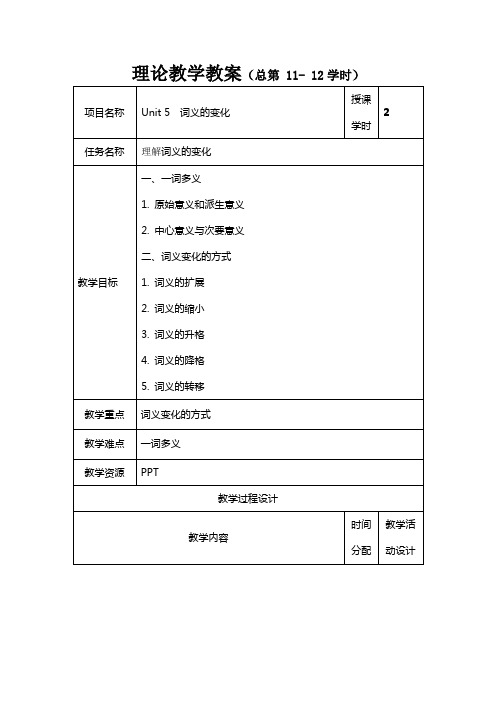
理论教学教案(总第 11- 12学时)项目名称Unit 5 词义的变化授课学时2任务名称理解词义的变化教学目标一、一词多义1. 原始意义和派生意义2. 中心意义与次要意义二、词义变化的方式1. 词义的扩展2. 词义的缩小3. 词义的升格4. 词义的降格5. 词义的转移教学重点词义变化的方式教学难点一词多义教学资源PPT教学过程设计教学内容时间分配教学活动设计Step1: 引入复习上一次学习内容Step2: 新课讲授-词义的变化词义的变化分类:1. 原始意义和派生意义A. 原始意义消失,派生意义代替B. 原始意义和派生意义皆保存,原始意义之存在固定词组或成语中。
2. 中心意义与次要意义1. 词义的辐射(radiation):一个词的主要以居于首位,次要意义就像光线一样向外辐射。
2. 连锁联结:concatenation:3. 无逻辑联系连锁链接:concatenation:从一个词义中衍生处第二个词义,第二个词义有衍生处第三个词义,如此下去。
二、词义变化的形式1.Expansion (extension/generalization) 词义的扩展概念:较狭窄的概念扩大到较宽广的概念,(从特指到泛指)2. Narrowing(restriction/specialization) 词义的缩小3. Elevation (amelioration) of meaning 词义的升格词义向褒义方向发展过程称为升格Lord原意为: loaf giver (发面包的人) 现意为:贵族4.Degradation/degeneration/deterioration词义的降格词义向贬义方向发展叫做词义的降格Silly 1. Happy, fortunate 2. holy, blessed(神圣的) 3. innocent, harmless 4. foolish, imbecile5. 词义的转移1)主观意识丧失、客观意义保留:Hateful:充满仇恨的、有敌意的;可恨的、讨厌的Painful:苦干的、勤劳的(painstaking, laborious) a painful preacher (a complimentary phrase)痛苦的,伤脑筋的作业布置复习所学内容授课日期及授课地点明德楼205 第周下午67节课后反思本课教学重点突出,层次分明。
英语词汇学词义的变化

On Word Format ion★Prefac eLearna langua ge; you must learnpronun ciati on, gramma r, vocabu lary. Amongthe threefactor s,vocabu laryhas a very import ant role in your langua ge-studyi ng. A famous schola r Wilkin ssaid”withou t gramma r, very little can be convey ed, withou t vocabu lary, nothin g can be convey ed.”Heemphas izedthat in most cases, the vocabu laryis more import ant than gramma r. Anothe r famous lexico logis tMcCart hy said, when a studen t learnthe second langua ge, no matter how well the studen t learns gramma r, no matter how succes sfull y he master s the second s of a L2, withou t wordsto expres s a wide rangeof meanin gs, commun icati on in that langua ge cannot happen in any manful way.From thesetwo exampl es and of course includ e many othercasesthat are not mentio ned here now, we can conclu dethatifyoudon‟tcarevocabu laryat all, it is imposs ibleto learna langua ge in some way. What‟smore, you cannot expres s your real feelin g no matter you are happy, sad, fortun e, or you are unluck y, becaus eyoudon‟tknowwhatwordsyou can say or you can write.Today, I will tell you what I had learne d in this class. What I will teachyouis“wordformat ion”,whydoIchoose this topicto talk? Becaus e in my opinio n, if you know the word format ion very well, you can rememb er and use the new wordseasily. Absolu tely,it‟sveryhelpfu l for your langua ge studyi ng.Don‟tyouthinkso?★Summar yEnglis h vocabu laryhas severa l of Word-format ion method s. But the threegreate st word format ion powers are affixa tion, compou nding, and conver sion. The othersix kindsof word-format ion method s includ e blendi ng, clippi ng, acrony my, back-format ion, soundredupl icati on, and commun izati on of proper names.★Keywor dsMorphe mes, classi fying, word-format ion★Contex tBefore talkin g aboutword format ion, maybewe should know the morpho logic al struct ure of Englis h wordsfirst. So what we will discus s next is morpho logic al struct ure of Englis h words. It includ esmorphe mes, morphs and allomo rphs,classi fying morphe mes, identi fying morphe mes, morphe mes and word-format ion.☆ morphe mesTradit ional ly, wordsare usuall y treate d as the basicand minima l unitsof a langua ge to make senten ce, whichare combin ation s of wordsaccord ing to syntac tic rules. Struct urall y, howeve r, a word is not thesmalle st unit becaus e many wordscan be separa ted into even smalle r meanin gfulunits. Theseminima l meanin gfulunitsare knownas morphe mes. In view of word-format ion, the morphe meisseenas…thesmalle st functi oning unit in the compos ition of words‟. Syntac tical ly, howeve r, a morphe me is the minima l form of gramma tical analys is.Morphe mes are abstra ct units, whichare realiz ed in speech by discre te unitsknownas morphs. They are actual spoken, minima l carrie rs of meanin g.Morphe mes vary in functi on. Accord ingly, we can classi fy morphe mes into severa l genera l catego ries:① Free versus BoundMorphe mes ---- morphe mes whichare indepe ndent of othermorphe mes are free. Thesemorphe mes have comple te meanin gs in themse lvesand can be used as free gramma tical unitsin senten ces. Morphe mes whichcannot occuras separa te wordsare bound. They are so namedbecaus e they are boundto othermorphe mes to form wordsor to perfor m a partic ulargramma tical functi on.② Deriva tiona l versus Inflec tiona l Morphe mes ---- morphe mes whichare used to derive new wordsare knownas deriva tiona l morphe mes becaus e when thesemorphe mes are conjoi ned, new wordsare derive d.③ Conten t versus Gramma tical Morphe mes ---- On a semant ic and syntac tic basis, morphe mes can fall into conten t and gramma tical morphe mes. Conten t morphe mes are lexica l morphe mes whichare used as we see aboveto derive new words, so also knownas deriva tiona l morphe mes.☆ Morphe mes and Word-format ionWe know that wordscan be analyz ed into morphe mes, whichare the minima l meanin gfulunitsin the compos ition of words. In word-format ion format ion, howeve r, morphe mes are conven tiona lly labele d root, stem, base and affix.Affixe s are formsthat are attach ed to wordsor elemen ts to modify meanin g or functi on. Affixe s are boundmorphe mes becaus e none of them can standas wordsin theirown right. Accord ing to the functi ons of affixe s, we can divide them into inflec tiona l affixe s and deriva tiona l affixe s. Deriva tiona l and inflec tiona l affixe s are identi cal with deriva tiona l and inflec tiona l morphe mes. In view of theirdistri butio n in the format ion of word, affixe s can fall into prefix and suffix.Before we beginour actual discus sionof word-buildi ng proces ses, thereare some basicconcep ts that need clarif ying:1. Root: a root is the basicform of a word whichcannot be furthe r analyz ed withou t totalloss of identi ty.2. Stem: a stem may consis t of a single root morphe me or of two root morphe mes. It can be a root morphe me plus one or more affixa tiona l morphe mes.3. Base: a base is referr ed to a form to whichaffixe s of any kind can be added. It can be a root or a stem.☆ Word Format ionThe expans ion of vocabu laryin modern Englis h depend s chiefl y on word format ion. Thereis a variet y of meansbeingat work now. The most produc tiveare affixa tion, compou nding and conver sion.⑴ Affixa tionAffixa tionis genera lly define d as the format ion of wordsby adding word-formin gor deriva tiona l affixe s to base. This proces s is also knownas deriva tion, by whichnew wordsare derive d from old or base forms. The wordscreate d in this way are called deriva tives. Accord ing to the positi ons affixe s occupy in words, affixa tionfallsinto two subcat egori es: prefix ation and suffix ation.Prefix ation includ es:Negati ve Prefix es (a-, dis- ,in-, non-, un-…)Revers ative or Privat ive Prefix es (de-, dis-,un,…)Pejora tivePrefix es (mal-, mis-, pseudo- …)Prefix es of Degree or Size (arch-, co-, extra-, hyper-, macro-, micro-, mini-, out-,over-, sub-, super-, sur-, ultra-, under-…)Prefix es of Orient ation and Attitu de (anti-, contra-, counte r-, pro-…)Locati ve Prefix es ( fore-, inter-, intra-, super-, tele-, trans-…)Prefix es of Time and Order( ex-, fore-, post-, pre-, re- …)Number Prefix es ( bi-, multi-, semi-,tri-,uni- …)Conver sionPrefix es ( a-, be-, en- …)Miscel laneo us Prefix es ( auto- , neo-, pan-, proto-, vice- …)Suffix ation includ es:Noun suffix es (denomi nal nouns, deverb al nouns, de-adject ive nouns, non andadject ive suffix es) Adject ive suffix es (denomi nal suffix es, deverb al suffix es )Adverb suffix es (Omit exampl e)Verb suffix es (Omit exampl e)⑵ Compou ndingCompou nding is the format ion of new wordsby joinin g two or more bases. Wordsw orthformed in this way are called compou nds. Compou nds can be writte n solid, hyphen atedand open.1. Charac teris ticsof compou ndsCompou nds have notice ablecharac teris ticswhichmay in most casesdiffer entia te themse lvesfrom noun phrase s in the follow ing four aspect s:Phonol ogica l featur es, semant ic featur es, gramma tical, orthog raphi cal featur es.2. Format ion of compou ndsCompou nding can take placewithin any of the word class, but the produc tiveones are nounsand adject ivesfollow ed by verbsto a much lesser extent. Noun compou nds, adject ive compou nds, verb compou nds.⑶ Conver sionConver sionis the format ion of new wordsby conver tingwordsof one classto anothe r class. Conver sionis genera lly consid eredto be a deriva tiona l proces swhereb y an item is adapte d or conver ted to a new word classwithou t the additi on of an affix. Hencethe name zero-deriva tion. Wordsproduc ed by conver sionare primar ily nouns, adject ives, and verbs.Conver sionto nouns(deverb al, de-adject ival, miscel laneo us conver sion) Conver sionto verbs(denomi nal, de-adject ival, miscel laneo us conver sion) conver sionto adject ives(voicel ess to voiced conson ant, initia l to end stress) the othersix meansof word-format ion includ es:Blendi ng, Clippi ng, Acrony my, Back-format ion, Soundredupl icati on, Commun izati on of proper names.Becaus e the wordslimit, the six word-format ion method s is not detail ed introd ucedhere. If you areintere stedin them, please referto the lexico logy.Annota tion:《英语词汇学教程》张伟友著,《词汇学学习指南》Thankyou for your review s !A happyNew Year, good health杨春慧著。
《现代英语词汇学》(新版)复习题
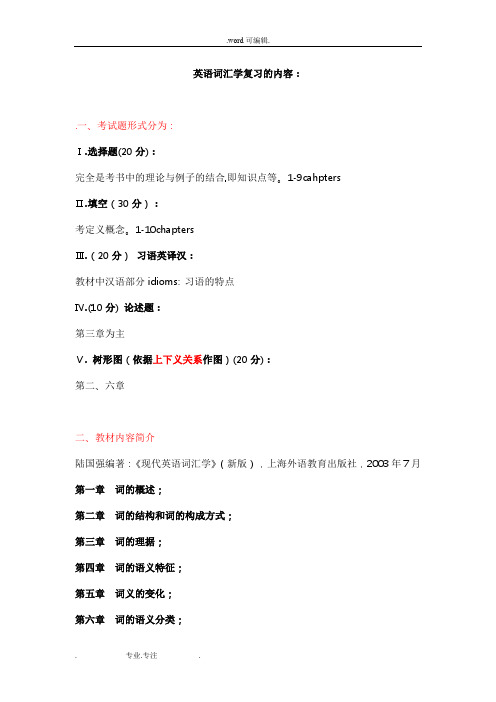
英语词汇学复习的内容:.一、考试题形式分为:Ⅰ.选择题(20分):完全是考书中的理论与例子的结合,即知识点等。
1-9cahptersⅡ.填空(30分):考定义概念。
1-10chaptersⅢ.(20分)习语英译汉:教材中汉语部分idioms: 习语的特点Ⅳ.(10分) 论述题:第三章为主Ⅴ. 树形图(依据上下义关系作图)(20分):第二、六章二、教材内容简介陆国强编著:《现代英语词汇学》(新版),上海外语教育出版社,2003年7月第一章词的概述;第二章词的结构和词的构成方式;第三章词的理据;第四章词的语义特征;第五章词义的变化;第六章词的语义分类;第七章词的联想与搭配;第八章英语习语;第九章美国英语;第十章词的使用和理解;第十一章词汇衔接;第十二章词汇衔接和语篇连贯。
教学内容是: 词形结构构词法, 词法特点及分类, 词义转换, 英文习语, 美式英语, 词汇及文学风格, 英语词汇学, 词汇学研究方法及其新的发展方向等方面的理论与研究动态。
《现代英语词汇学教材》以现代语言理论为指导,以英语词汇为研究对象。
主要内容有单词的结构、构词法、单词的意义及词义关系、英语词汇的构成、词义的历史演变、成语及词典知识。
本课程可以使学生比较系统地掌握英语词汇的知识,比较深入地了解英语词汇的现状及历史演变过程,并能对现代英语词汇发展的趋势和所出现的现象作出分析和解释,提高运用英语的能力。
本课程特别强调和重视研究生广泛阅读英语词汇学、语言学、语义学、词源学方面的书籍,以教师精讲、学生宽学为目的。
本课程的教学目的, 在于指导学生用现代语义学和语法学的有关理论分析研究现代英语词汇现象, 揭示现代英语词汇规律。
要求学生通过英汉词汇的对比研究, 探讨英语词汇教学规律, 指导英语语言实践, 不断提高对现代英语词汇的理解, 应用和研究能力。
主要参考书汪榕培,《英语词汇学研究》,上海外语教育出版社,2000年4月第一版王文斌,《英语词汇语义学》,浙江教育出版社,2001年6月第一版汪榕培、卢晓娟编著:《英语词汇学教程》,上海外语教育出版社,1997年10月第1版.汪榕培主编:《英语词汇学高级教程》,上海外语教育出版社,2002年11月张韵斐:《英语词汇学》北京师范大学出版社.汪榕培《英语词汇学教程读本》上海外语教育出版社.1. Carter, R. (1987), Vocabulary: Applied Linguistic Perspectives. London: Allen & Unwin.2. Carter, R. & M. McCarthy, (1988), Vocabluary and Language Teaching. Harlow; Longman.教学手段:采用多媒体教学本课程要求学生能够比较全面、比较系统地了解现代英语词汇学这一领域的一些最主要、最有影响的语言学理论,能够运用词汇学理论去分析和解决词汇学习中的一些问题。
(完整word版)现代英语词汇学概论最强版复习资料chapter5
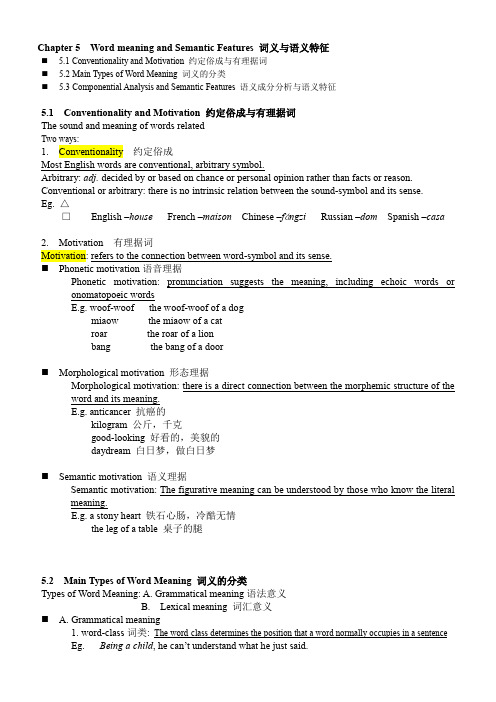
The sound and meaning of words related
Two ways:
1.Conventionality约定俗成
Most English words are conventional, arbitrary symbol.
Chapter 5Word meaning and Semantic Features词义与语义特征
5.1 Conventionality and Motivation约定俗成与有理据词
5.2 Main Types of Word Meaning词义的分类
5.3 Componential Analysis and Semantic Features语义成分分析与语义特征
Eg.△
□English –houseFrench –maisonChinese –fángziRussian –domSpanish –casa
2. Motivation有理据词
Motivation:refers to the connection between word-symbol and its sense.
Arbitrary:adj.decided by or based on chance or personal opinion rather than facts or reason.
Conventional or arbitrary: there is no intrinsic relation between the sound-symbol and its sense.
E.g. anticancer抗癌的
kilogram公斤,千克
词义演变的方式

silly
blessed , happy → innocent ,harmless→ simple or simple-minded → foolish, imbecile satisfied, contented → calm → serious → sorrowful
sad
Euphemism 委婉语
grasp(抓—领会)
From technical terms to general words allergic
Generalization of meaning is also found in many technical terms, which are confined to pecialized use.
di
er
zhang
jie
第 二 小 节
词义演变的方式
Extension of meaning 词义的扩大 Loss of old meanings 旧义的消亡 Narrowing of meaning 词义的缩小
Lexical revivals 新义的诞生
词义演变 的方式
Elevation of meaning 词义的升格
Degradation of Meaning 词义的降格
It is a process by which words with appreciatory or neutral affective meaning fall into ill reputation or come to be used in a derogatory sense.
Archaic meaning: old and no longer used. 过时义 Word bare doctor Old Meaning worthless teacher
词义和词义的演变课件

实例三:外来词汇词义的演变
总结词
外来词汇是指从其他语言中引入的词汇 ,其词义的演变往往受到语言文化差异 的影响。
VS
详细描述
外来词汇的词义演变过程比较特殊,往往 涉及到语言文化的交流和融合。例如,“ 咖啡”一词来源于阿拉伯语,最初是指用 开水冲泡的饮料,后来逐渐演变为指代咖 啡豆和咖啡店;“沙发”一词来源于英语 ,最初是指一种软垫椅子,后来逐渐演变 为指代家具和家居用品。
词义是社会成员共同认 可和使用的,随着社会 的发展和变化,词义也
会发生变化。
词义的类型
01
02
03
本义
指一个词最初的含义,通 常是其字面意义。
引申义
指一个词从本义派生出来 的意义,通常是根据事物 的内在联系或比喻、象征 等方式引申出来的。
比喻义
指通过比喻手法所形成的 一种特殊的比喻意义,通 常是通过联想而产生的。
感谢您的观看
TH义演变的未来展望
深入研究词义演变的规律
未来研究可以进一步深入探讨词义演变的规律,揭示更多词义演 变的内在机制。
跨语言比较研究
通过跨语言比较研究,可以发现不同语言中词义演变的共性和差异 ,有助于更全面地理解词义演变的本质。
结合实际应用研究
结合语言实际应用,如自然语言处理、机器翻译等,研究词义演变 对于提高语言技术的准确性和效率具有重要意义。
02 词义的演变过程
词义演变的类型
时间变化
随着时间的推移,词义可能会发 生变化。例如,“报纸”一词在 古代指的是写字的纸,而现在指
的是印刷的新闻纸。
地域变化
在不同的地区,同一个词可能会 有不同的含义。例如,“肥皂” 在某些地区指的是清洁身体用的 物品,而在其他地区则指的是清
英语词汇学

摘要:本文从英语词义演变发展的过程中,分析了旧有词义内涵延伸和外延扩展的诸多因素。
初步阐述了英语词义的变化对社会发展所产生的积极意义,以及英语词义变化的趋势。
关键词:词义;变化;因素;正如世间万物无时无刻不在变化之中一样,词义的变化是一种必然的历史发展趋势。
在活的语言(a living language)中,词义的变化是十分常见而又非常必要的。
人类社会发展到了一定阶段,就需要对新的概念、新的现象、表达新的事物、新的观点有一个不同于以往的表达形式,而词义变化正是满足人们这种需要的简便方式。
因此,我们今天所使用的每一个词语的意义,与一个世纪以前相比,都略有不同,在更长时间以前,可能有一个更为不同的意义。
一个词的旧有意义的改变或消失,以及新意义的产生是和人类社会、文化、科技、教育的发展和变化有密切关系的,这是词义变化的外因;与此同时,语言自身的变化,人们的心理活动对词义的变化也有一定的影响,本文旨在对英语词义变化的诸多因素和成因做以下简要的探讨。
1、社会的发展是词义变化的历史因素人类社会的不断发展,必然促进各个事物由简到繁,由初级到高级。
伴随事务的发展,表示事物、现象、行为名词的词也必然有所变化,这就是词义变化的历史原因。
表示人们日常生活使用的物品名称的词义往往发生潜在的变化。
例如: paper一词来源于希腊词papyros,是指埃及的一种植物“芦草”。
在古代,这种植物的茎曾用作书写的材料,后来出现了新的书写材料———纸, paper一词的词义就逐渐转向了纸。
book从前是一种数木的名称。
人们曾把这种树剖成薄板,在上面刻字,并将几块薄板联接起来。
随着纸的发明, book一词的词义转向装订成册的书。
doom一词在古英语中表示比较广泛的意义。
“方法、手段、门路”等。
到了乔(Chaucer)时代,表示“Judgment”(最后的见解)。
后来在莎士比亚的戏剧中的词义转为“厄运、劫数、灭亡”,如“查理三世”(RichardⅢ)中的一句:All unavoided isdoom of destiny(所有不可避免的是劫数难逃)。
英语词汇学复习重点——5、7-12单元
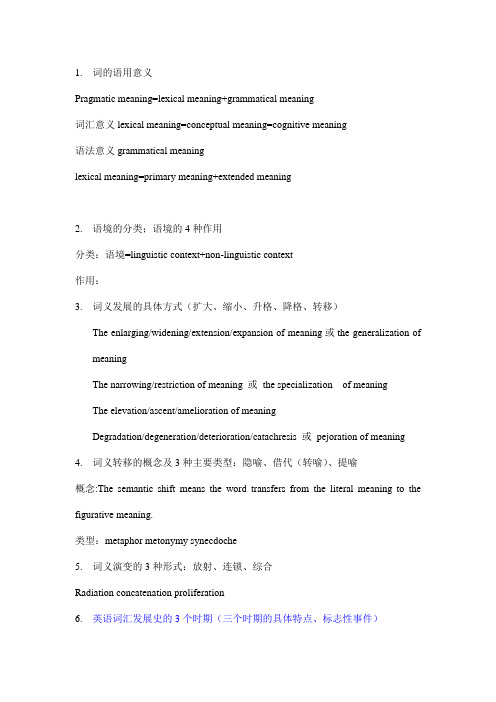
1.词的语用意义Pragmatic meaning=lexical meaning+grammatical meaning词汇意义lexical meaning=conceptual meaning=cognitive meaning语法意义grammatical meaninglexical meaning=primary meaning+extended meaning2.语境的分类;语境的4种作用分类:语境=linguistic context+non-linguistic context作用:3.词义发展的具体方式(扩大、缩小、升格、降格、转移)The enlarging/widening/extension/expansion of meaning或the generalization of meaningThe narrowing/restriction of meaning 或the specialization of meaningThe elevation/ascent/amelioration of meaningDegradation/degeneration/deterioration/catachresis 或pejoration of meaning 4.词义转移的概念及3种主要类型:隐喻、借代(转喻)、提喻概念:The semantic shift means the word transfers from the literal meaning to the figurative meaning.类型:metaphor metonymy synecdoche5.词义演变的3种形式:放射、连锁、综合Radiation concatenation proliferation6.英语词汇发展史的3个时期(三个时期的具体特点、标志性事件)The old EnglishThe middle EnglishThe modern English7.英语词汇的3种来源:本族语词、借词、新词Native words. loan/borrow words. Neologism8、新词的概念及4种产生方式(途径)新词(neologism&vogue words )A neologism is a recently coined word,phrase or usage.It can also be an existing word or phrase which has been assigned a new meaning.产生:1.构词法造词Word formation 2.借词borrowing 3.杜撰新词new coinage 4.语义转换semantic shift9、全世界使用英语国家的分类:ENL,ESL,EFLENL:English as a native languageESL:English as a second languageEFL:English as a foreign language10、美国英语词汇各发展阶段的特点(标志性事件)1.17世纪初到北美独立战争结束词美国在语言上的独立汇学家韦伯斯特美国独立战争后到内战占主导地位的仍然是英国英语美国内战后美国成为世界“盟主”对英语的影响不断扩大11、英语搭配的3种类别:固定型组合(成语/习语),自由型组合,习惯型搭配(能举例说明)固定型组合(fixed combination):see eye to eye(with)自由组合(free combination): see a film习惯型搭配(natural collocation): a cigar smoker12、搭配的4种理据语法(grammatical motivation)语用(pragmatic motivation)语义(semantic motivation)认知(cognitive motivation)13、英语成语的4个特点习用性:idiomaticity定型性:syntactic frozenness整体性:semantic nuity不透明性:semantic opacity14、英语成语的分类按句法分类:1.nominal idioms2.adjectival idioms3.verbal idioms 4.advertial idioms 5.sentence idioms最常见的按形式分类:1.比喻成语(figurative idioms)--隐喻成语(metaphorical idioms)明喻成语(similized idioms)2.谚语(proverbs)3.俚语(slang)。
《现代英语词汇学概论》----解析(张韵斐)
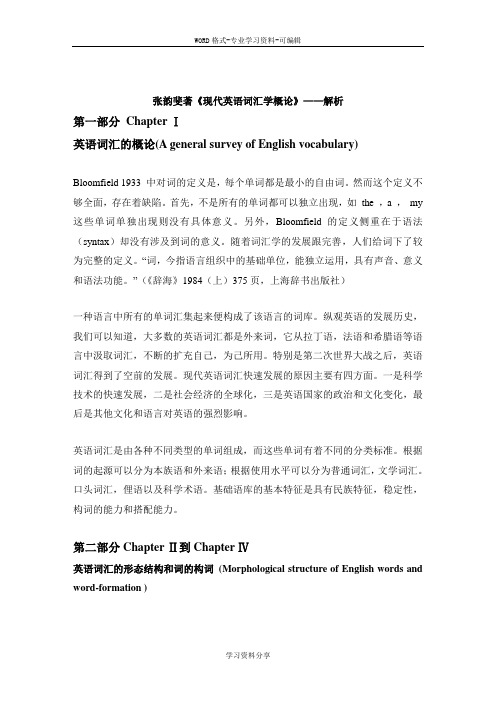
张韵斐著《现代英语词汇学概论》——解析第一部分Chapter Ⅰ英语词汇的概论(A general survey of English vocabulary)Bloomfield 1933 中对词的定义是,每个单词都是最小的自由词。
然而这个定义不够全面,存在着缺陷。
首先,不是所有的单词都可以独立出现,如the ,a ,my 这些单词单独出现则没有具体意义。
另外,Bloomfield的定义侧重在于语法(syntax)却没有涉及到词的意义。
随着词汇学的发展跟完善,人们给词下了较为完整的定义。
“词,今指语言组织中的基础单位,能独立运用,具有声音、意义和语法功能。
”(《辞海》1984(上)375页,上海辞书出版社)一种语言中所有的单词汇集起来便构成了该语言的词库。
纵观英语的发展历史,我们可以知道,大多数的英语词汇都是外来词,它从拉丁语,法语和希腊语等语言中汲取词汇,不断的扩充自己,为己所用。
特别是第二次世界大战之后,英语词汇得到了空前的发展。
现代英语词汇快速发展的原因主要有四方面。
一是科学技术的快速发展,二是社会经济的全球化,三是英语国家的政治和文化变化,最后是其他文化和语言对英语的强烈影响。
英语词汇是由各种不同类型的单词组成,而这些单词有着不同的分类标准。
根据词的起源可以分为本族语和外来语;根据使用水平可以分为普通词汇,文学词汇。
口头词汇,俚语以及科学术语。
基础语库的基本特征是具有民族特征,稳定性,构词的能力和搭配能力。
第二部分Chapter Ⅱ到Chapter Ⅳ英语词汇的形态结构和词的构词(Morphological structure of English words and word-formation )(一)词素(Morphemes)单词是有词素(morphemes)构成的。
词素即英语语言中有意义的最小单位,同时具有声音和意义。
单词可以有一个或一个以上的词素组成。
如:nation 是一个词素,national有nation+al 两个词素。
- 1、下载文档前请自行甄别文档内容的完整性,平台不提供额外的编辑、内容补充、找答案等附加服务。
- 2、"仅部分预览"的文档,不可在线预览部分如存在完整性等问题,可反馈申请退款(可完整预览的文档不适用该条件!)。
- 3、如文档侵犯您的权益,请联系客服反馈,我们会尽快为您处理(人工客服工作时间:9:00-18:30)。
例如:copper 原指铜,可用来指铜币(coin)。
词义随着社会的发展会出现分化的现象。有 的词的原始意义可能丧失,为派生意义所 代替。
由此可联系第三章中词义的变化使词的理据
丧失,导致有的词的本义与转义联系不密
切或判若两个词。
例如: pupil 原指 监视者;学者
现指 学生,弟子
但仍可指瞳孔,由“反映在某人眼睛中的一 种人影或物影”演变而来。
综上所述
语义理据为理论基础
原始意义
通过隐喻、借代、提喻等
派生意义
词义变化
词的理据丧失
中心意义和次要意义
如下图
强国 Power 放大率 控制权
能力
权限 体力
乘方
机械能
普遍意义和特殊意义
由于词义范围在历史演变中的扩大或小, 有 些词既可以指一类事物,也可以指这类事 物中 的一个。
例如: fire泛指各类 “火” ,在 the fire in the sitting room中特指 “炉火”。
比喻意义 不热情的,冷冰冰的 a cool reception 冷漠的接待
• 词具备两个或两个以上的意义便成为多义词。
一词多义分析
• 普遍意义和特殊意义
• 原始意义和派生意义
• 抽象意义和具体意义
• 中心意义和次要意义
• 字面意义和比喻意义
原始意义和派生ቤተ መጻሕፍቲ ባይዱ义
原始意义,即本义。 派生意义:词在发展过程中形成的,称转义。
e.g. Harvest 原义
转义
秋天
收割;收成
有的原始意义与派生意义同时在现代英语中
保存下来,但前者多半出现在固定词组或
成语中,而后者用得比较自由和广泛。
例如 Pain 原义 惩罚 pains and penalties 译作 刑罚
而作“痛苦”解则用得广泛的多。
原始意义与派生意义关系
可以联系到第三章中的语义理据
语义理据是一种心理联想,指词义的引申和
比喻。以此为基础通过隐喻、借代、提喻
一词多义
• 一词多义的形成 • 一词多义分析
何晓非
一词多义的形成
一个词刚出现的时候只是用作一定的事物、
现象、 性质或者行为的名称,因而总是单 义的,继而在语言发展过程中逐渐获得新
义, 这样便形成了一词多义。
例如
• 原义
Albatross
• 引申义
信天翁
Manuscript 手稿
忧虑之源
底稿
• 一词多义是词义变化的结果。
抽象意义和具体意义
这两个意义也是词义范围变化的结果。英语 词汇中很多抽象名词都可用来指具体事物, 反之亦然。 例如:
Government eye nerve 政府----治理国家 眼----眼光 神经----勇气,力量
字面意义和比喻意义
Cool
字面意义 a cool breeze 凉的 一阵凉风
